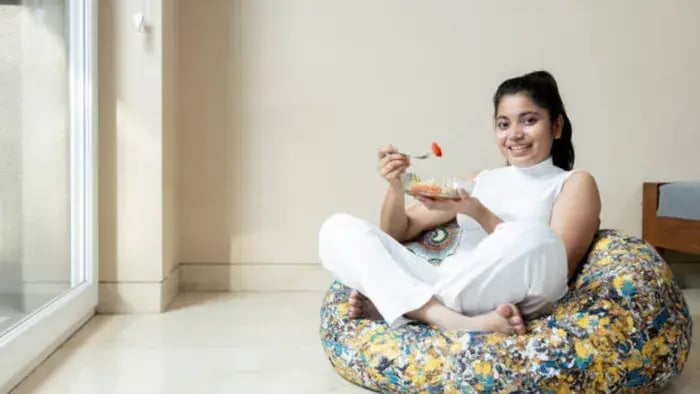- Stick to a Bedtime Routine
- Talk About Your Feelings Often
- Take Short Breaks During the Day
- Move Your Body in Ways You Enjoy
- Limit Negative Screen Time
- Practice Gratitude Daily
- Try Mindfulness or Breathing Exercises
- Stay Connected with People Who Support You
- Create a Safe Mental Space Through Hobbies
Introduction
The teen years bring many changes, from growing responsibilities and emotional highs and lows to school stress and social pressures. With so much happening, it’s natural to feel overwhelmed at times. That’s why developing healthy mental habits early can make a big difference. Simple, positive routines can help you stay balanced, think clearly, and face everyday challenges with more confidence and ease.

Mental health isn’t just about how you feel during tough times. It’s about how you take care of yourself every day, through sleep, connection, movement, mindfulness, and positive thinking. These daily actions give you the strength to bounce back from stress, stay focused, and feel more balanced even when life gets crazy.
The good news is that small habits can make a big difference, and you don’t have to change everything at once. Just start with one or two practices like journaling, talking to someone you trust or taking short breaks when you feel overwhelmed. Over time these habits build resilience and help you stay connected to your emotions without letting them control you.
9 Mental Health Habits Every Teen Should Practice

Taking care of your mental health doesn’t require big changes. It starts with small daily habits that help you feel calmer, strong, and in control. These habits support your emotional well-being and build a foundation for a confident life.
Stick to a Bedtime Routine
Getting enough sleep helps you focus, manage emotions and feel more positive. Try going to bed and waking up at the same time every day, even on weekends. A bedtime routine supports brain function and emotional balance and makes it easier to deal with school, friends, and unexpected stress. Avoid screens before bed and build a wind-down routine to help you relax.
Talk About Your Feelings Often
Whether it’s a small worry or big challenge, talking to someone you trust, like a parent, friend, teacher, or counselor, can help you feel supported. When you express what’s on your mind, you give your thoughts space and reduce emotional pressure. Don’t wait until things get overwhelming. Making regular conversation about emotions a part of your life builds trust and emotional awareness.
Take Short Breaks During the Day
It’s okay to step away from tasks when your mind feels full; that is where short breaks give your brain time to rest. Ask kids to take 5-10 minutes to stretch, breathe, doodle, or go outside; these moments of stillness improve focus and prevent burnout. Breaks help you come back to your work with a clearer head and more energy, especially during long school or study sessions.
Move Your Body in Ways You Enjoy
You don’t need a strict workout plan to feel the benefits of exercise. Whether it’s dancing, walking, playing a sport, or riding a bike, regular physical activity releases endorphins – chemicals that improve your mood. It also reduces stress and helps you sleep better. The key is to choose activities you like, so moving your body feels fun, not forced.
Limit Negative Screen Time
Spending too much time on social media or consuming harmful content can affect your mood and self-esteem. Set healthy boundaries for screen time and be mindful of how certain apps or posts make you feel. Instead of scrolling endlessly, use your screen time to learn something new, connect with friends, or enjoy a creative hobby. Your mental space is valuable – protect it.
Practice Gratitude Daily
Take a moment each day to think about something you’re thankful for – like a kind gesture, a good meal, or a sunny afternoon – and it will shift your mindset. Gratitude doesn’t erase problems, but helps you see the good alongside the challenges. Write in a journal, share it out loud, or simply reflect silently. This practice builds emotional strength and optimism.
Try Mindfulness or Breathing Exercises
Mindfulness means paying attention to the present moment without judgment. Breathing deeply, focusing on sounds around you or doing a short guided meditation can calm racing thoughts and bring a sense of control. These practices reduce anxiety, improve focus, and help you respond to stress more calmly. Just a few minutes a day can make a big difference.
Stay Connected with People Who Support You
Positive relationships help you feel seen, heard, and valued. Make time for friends and family who support your goals and respect your feelings. Avoid people who make you feel small or judged. Strong connections build your self-esteem and provide a safe space for you to be yourself, especially when things get tough.
Create a Safe Mental Space Through Hobbies
Time spent on activities that bring you happiness, such as music, art, writing, cooking, or reading, gives your mind a break and helps you feel more grounded. These hobbies give you a sense of purpose beyond academics or social pressures. They allow you to explore your identity and recharge emotionally.
Conclusion

Try a few of these, and your mind will feel clearer, your emotions will be more balanced, and your self-esteem will be stronger. The more you care for your mental health, the more you’ll be able to handle the ups and downs with steady, quiet strength.
Her love for storytelling began with reading her grandfather’s speeches, where Tarishi saw the power of words in creating lasting memories. Combining her passions for food and writing, she has turned her life into a fulfilling path of sharing stories that celebrate flavours and how food brings communities together.
The views expressed are that of the expert alone.
The information provided in this content is for informational purposes only and should not be considered a substitute for professional medical advice, diagnosis, or treatment. Always seek the advice of your physician or another qualified healthcare provider before making any significant changes to your diet, exercise, or medication routines.
















